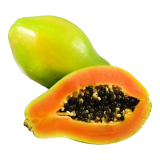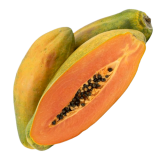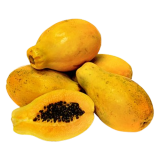Papaya
“TASTE THE TROPICAL SUNRISE, NATURALLY SWEET AND SATISFYING!”
Nutritional Content of Papaya (per 100g)
Calories
43
Sugars
9g
Carbohydrates
11g
Protein
0.5g
Fiber
1.7g
Fat
0.2g
Vitamin C
60.9mg (102% of the daily recommended intake)
Folate
38µg (10% of the daily recommended intake)
Vitamin A
950 IU (19% of the daily recommended intake)
Potassium
257mg (7% of the daily recommended intake)
Health Benefits of Papaya
Rich in Vitamin C
Papayas are an excellent source of vitamin C, which boosts the immune system and promotes healthy skin.
Digestive Health
Papayas contain an enzyme called papain, which aids digestion and can help with bloating and indigestion.
Heart Health
The high fiber and potassium content of papayas may help maintain healthy blood pressure and reduce the risk of heart disease.
Eye Health
Papayas are rich in beta-carotene, which is beneficial for eye health and may reduce the risk of age-related macular degeneration.
Anti-Inflammatory
The antioxidants in papayas, such as beta-carotene and flavonoids, have anti-inflammatory properties.
Skin Health
Papayas are often used in skincare products due to their skin-friendly nutrients. Eating them can contribute to healthy and glowing skin.
Naturally Sweet, Naturally Healthy!
Recommended Daily Intake
There is no specific daily intake of papayas, but including a serving (about half a papaya) in your daily diet is a healthy choice. It provides you with a good dose of vitamins and fiber.
Best Time to Eat Papayas
Papayas can be eaten at any time of the day. Some people prefer them for breakfast, while others enjoy them as a snack or dessert after meals.
How Papayas Grow
Papayas grow on small to medium-sized trees known as Carica papaya. The fruit is typically elongated and can vary in size, from small to large. The inner flesh is orange to pinkish in color and filled with small black seeds, which are edible but often discarded.
Places Where Papayas are Grown
Papayas thrive in tropical and subtropical regions. They are cultivated in countries such as India, Mexico, Brazil, Indonesia, and the Philippines. In the United States, papayas are primarily grown in Hawaii and parts of Florida and California.
Types and Varieties
There are several varieties of papayas, each with its unique flavour and characteristics. The choice of variety may vary depending on the region and personal preference. Papayas can be enjoyed fresh or used in smoothies, salads, and desserts. Papayas are not only delicious but also packed with essential nutrients and health benefits. Adding them to your diet can be a flavourful way to enhance your overall well-being.
Solo Papaya
This is a smaller variety known for its sweet and juicy flesh.
Maradol Papaya
Larger in size with vibrant orange flesh, Maradol papayas are a common variety in Mexico.
Hawaiian Papaya
These are often small to medium-sized and have orange or yellow flesh.



















 Mango
Mango Banana
Banana Pomegranate
Pomegranate Guava
Guava Papaya
Papaya Apple
Apple Orange
Orange Kiwi
Kiwi Strawberry
Strawberry Grapes
Grapes Watermelon
Watermelon Sapota
Sapota Amla
Amla Pineapple
Pineapple Coconut
Coconut Spinach
Spinach Broccoli
Broccoli Tomatoes
Tomatoes Carrots
Carrots Cabbage
Cabbage Bell Peppers
Bell Peppers Cauliflower
Cauliflower Bitter Gourd
Bitter Gourd Eggplant
Eggplant Okra
Okra Green Peas
Green Peas Onions
Onions Garlic
Garlic Pumpkin
Pumpkin